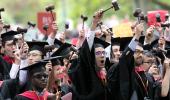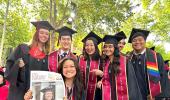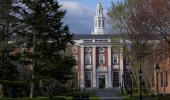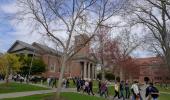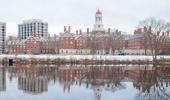Donald Trump is catering to the basest fears and prejudice of unenlightened Americans -- yes, there are those too, in sizeable enough numbers to elect one of their own as president.
That would most certainly not Make America Great Again, asserts Shreekant Sambrani.

Content Alert: This is an intensely personal statement. Please do not read further if these sorts of writings irritate or embarrass you.
Early in the ninth decade of my life, I began to get a sense that the world I lived in was undergoing drastic changes, sadly for the worse.
Political environment the world over was turning more uncivilised by the day.
Cherished institutions which sustained one's intellectual and cultural life were under attack which they seemed incapable of resisting.
The future was not particularly welcoming. But, as a friend put it, "our day-to-day lives are mostly going to be business as usual.
You'll still need tea in the morning and you'll still accidentally eat the entire bag of chips at 2 am like me.
So turn down the anxiety thermostat. Travel, party, dance and sing karaoke like your mic is on fire."
Sensible and practical, but I don't sing, not even if a gun is pointed at me. My way of turning down the anxiety thermostat was to give my column writing a rest.
I resolved not to comment on political or social issues, since those would only highlight the bleakness I was drowning in.
I would share my views on books, films, music, cricket ... anything that would bring even a small cheer.
But here too, I have had to suffer through approximately 10 bad books, one worse than the other, to come across something worth talking about.
I discovered I was not alone in my blue funk.
Paul Krugman, the Nobel Laureate economist who wrote eminently readable and enjoyable columns for the redoubtable The New York Times for 25 years, announced at the end of last year that he would stop his columns for reasons not too dissimilar to mine.
I have since discovered that being in good company does not necessarily reduce despair.
But then the spreader-of-despair-in-chief President Donald J Trump of the (dis)United States of America did something so outrageous that stood out even in the vast cache of misdeeds and misdemeanours he has acquired in just about 100 days of his misrule that I had to share my anger and disbelief.
I refer to Trump's tilting with all the might his office gives him (and then some) at American academia, especially at that most venerable and prestigious grand institution, Harvard University.
Harvard, founded 389 years ago, is the oldest American institution of higher learning. It is considered as the symbol of excellence even by its competitors.
Northwestern University at Evanston, Illinois (just outside Chicago), which I attended a lifetime ago, is among the finest universities and figures on nearly all top ten lists.
It is called the Harvard of the Midwest, a title it wears with pride. As does Duke in North Carolina, the Harvard of the Southeast.
Trump's Homeland Security Department, which controls immigration, has threatened to revoke the Harvard permit to enrol foreign nationals as students on grounds that the university and its students nurse antisemitism and also favour Chinese communist ideology.
Those are laughable charges. Most American universities and colleges have a disproportionately large representation of Jewish persons among their student bodies and faculty.
I don't have exact figures, but Harvard's representation of Jewish persons would be easily among the highest among its cohorts.
And liberal philosophy, which not just Harvard but most universities espouse, is not synonymous with Chinese Communist ideology.
Clearly, Trump is using flimsy administrative grounds to attack Harvard.
Earlier, soon after he began his second term, Trump had suspended American government grants to scores of universities, Harvard among them, for following what he considered anti-American approaches, as part of his anti-DEI (diversity, ethnicity, inclusion) strategy.
Most institutions have started a fightback and Harvard has filed a lawsuit against the administration.
Trump has also threatened cancelling the tax-exempt status enjoyed by Harvard Corporation, the parent body that controls the University's vast corpus of endowments amounting to over $50 billion.

Most reactions to the Trump campaign against Harvard have focussed on its consequences for foreign students and its impact on university finances (Harvard, like most American institutions, charges higher tuition to foreign students as compared to US citizens).
Significant as these may be, they are not the main issue to me. I believe Trump has declared war against American academia.
That may be consistent with his vicious and vindictive make-up (universities and academics have consistently opposed Trump and his MAGA politics ever since his ascendancy among the Republicans).
I also believe that this is a war aimed at the very roots of American excellence and if successful, will leave the United States not even a pale shadow of itself.
A little personal digression is needed here to fully explain this view.
My fascination with the United States began when I was a mere teenager, studying engineering in what was to become a globally-recognised powerhouse institution, the Indian Institute of Technology, Bombay.
What began as a romantic vision of the good life nurtured thorough American fiction and Hollywood films soon became a serious concern about excellence and values.
That led to my deciding to pursue higher learning in the US even before I had graduated.
My entire life has been shaped by five phases of academic pursuits.
The first was my secondary education in an exemplary high school at Bordi near Mumbai, a school that still runs on Gandhian values more than 100 years after it was founded. Then came IIT.
Graduate studies in Northwestern and Cornell followed. I was on the faculty of Indian Institute of Management, Ahmedabad, a pioneer body of management education and research which has been widely recognised the world over.
And then I had the great good fortune of being the first head of the Institute of Rural Management at Anand under the visionary leadership of Dr Verghese Kurien.
Of these, the IITs and the IIMs are now under government straitjacket, with the Visitor (the President of India) being able to override any decision of the faculty or the governing body.
IRMA has just lost its identity, after being nationalised as the Tribhovandas University of Co-operation under the Ministry of Co-operation, wiping out all references to Dr Kurien.
And now the Trump threat looms large over American universities.
I would any day rate my time in the US centres of higher learning at the top of my experiences, a rating I can say without fear of contradiction all members of my generation, the first to enter American universities in sizeable numbers in the mid- and late 1960s, would share.
We provided the sturdy shoulders on which our successor generations stood to establish the high watermark of Indian academic excellence in the latter part of the last century.

We thought that the learning experience at IIT Bombay was pretty exciting, where we were encouraged to seek more than what was taught in the classrooms or contained in the texts.
But American universities were a world apart. No question was ever too elementary nor new explorations discouraged in any way at all.
In my own case, Professor George Brown of Northwestern urged me to read Josiah Willard Gibbs' Laws of Thermodynamics in the original, to better equip me for my research on oil wells.
He held my hand and led me through the extremely difficult to understand text of the renowned scientist.
Professor Chandler Morse of Cornell told me that I must never forget to ask the question why.
He, too, insisted that as a wannabe economist, I must read as many of the classics in the original as I possibly could.
He set me the task of critiquing Gunnar Myrdal's Asian Drama (which had just been published) as the test for my entrance to the dissertation stage.
I mention these to share the sense of exhilaration that education created.
And our acculturation into literature, music, visual and performing arts that the university facilitated was the icing on the cake.
Making lifelong friends with kindred souls (and finding the love of one's life) were benefits beyond value.
I am certain mine was by no means a unique case. A thousand such stories and more can be told with some small variations on the theme.
In substance, this sojourn made us infinitely better persons and our lives equally infinitely more meaningful.
(For full disclosure, I must mention here that the mid-1960s were marked by greater political and social awareness in universities than ever before, all over the world. That was especially true of American academia. I had more than my fair share of activism. Even a small fraction of that would result in my having to self-deport myself from Trump's America.)
It is this Arcadian educational universe that Trump is bent upon destroying.
He does not understand that the smart phones he wants to be made in the US or the Golden Dome of space security he wants in place are all the canopy of the American Giant Redwood of Knowledge.
A strike at its roots which Trump is hard at work will surely destroy that tree. But then Trump and logic are an oxymoron.

American presidents are often seen as extraordinary individuals. Dwight Eisenhower started work on new infrastructure through the interstate highway network to bring prosperity. He was also sagacious enough to warn against the military-industrial complex.
John F Kennedy accepted the challenge of placing an American on the moon in a decade and boosted funding for scientific research.
Even as he hopelessly pursued the War in Vietnam, Lyndon Johnson pushed through the Great Society programme which greatly enhanced social equality in a multi-ethnic and multi-racial society.
And all of them, up to Joe Biden, supported the university system as the bedrock of American progress.
As did numerous governors of both parties who supported the vast network of state universities.
Education has been the truest bipartisan American enterprise.
Contrast that with Donald Trump. He is catering to the basest fears and prejudice of the unenlightened Americans -- yes, there are those too, in sizeable enough numbers to elect one of their own as president.
That would most certainly not Make America Great Again.
Far from it, it would result in Loss for America its Merited Excellence (LAME).
Photographs curated by Manisha Kotian/Rediff
Feature Presentation: Aslam Hunani/Rediff
